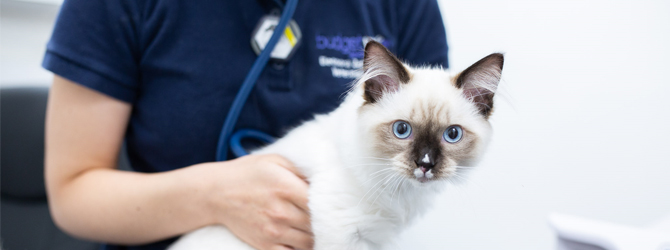Kitten vaccination schedule
Vaccinating your cat is one of the best ways to protect them from serious and potentially life-threatening diseases. These illnesses — like feline parvovirus, feline herpesvirus, and feline leukaemia virus — can cause lasting health issues and can sometimes be fatal.
Vaccines also help prevent the spread of disease within the broader cat population. This protection is especially helpful in areas with lots of cats.
Core vs. non-core vaccines
Core vaccinations are recommended for all cats, regardless of whether they stay indoors or go outside.
Core vaccines protect against highly contagious diseases with serious health impacts. These include feline parvovirus (also known as infectious enteritis or feline panleukopenia), and the main diseases behind cat flu—feline herpesvirus and feline calicivirus.
Non-core vaccines are recommended based on your cat’s lifestyle — if your cat spends time outdoors or meets other cats, for example, extra vaccines may be needed to reduce the risk of other infections.
The main non-core vaccines include those for feline leukaemia virus and, in rare cases, Chlamydophila felis, which is more prevalent in homes with more than one cat. If your cat goes outside, your vet will probably recommend the feline leukaemia vaccine, as this virus is passed through direct contact with other cats and can lead to serious health issues like lymphoma and immunosuppression.
Which vaccinations does my cat need?
Vaccines for cats are available for several diseases, including:
- Feline parvovirus (FPV, also referred to as feline distemper, feline infectious enteritis or feline panleukopenia)
- Feline rhinotracheitis (caused by feline herpesvirus, FHV)
- Feline calicivirus (FCV)
- Feline leukaemia virus (FeLV)
- Chlamydophila felis
- Bordetella bronchiseptica
- Rabies
The primary cat inoculations Pet Health Club members receive as part of their benefits cover:
- Feline parvovirus (FPV)
- Feline rhinotracheitis (FHV)
- Feline calicivirus (FCV)
- Feline leukaemia virus (FeLV)
Read more: Feline herpesvirus causes, symptoms and prevention
Kitten vaccination timeline
It’s important for kittens to follow a set vaccination schedule to provide them with strong, lasting immunity.
First vaccination: 8-10 weeks old
Vaccines: Feline leukaemia, and a three-in-one covering feline parvovirus, feline herpesvirus, and calicivirus.
Why: These illnesses are particularly dangerous for young kittens with immature immune systems. Feline parvovirus, for example, can cause severe vomiting, diarrhoea, and dehydration and is often fatal without vaccination.
Second vaccination: 11-14 weeks old
Vaccines: Feline leukaemia, and the three-in-one including feline parvovirus, feline herpesvirus, and calicivirus.
Why: A booster dose strengthens initial immunity. The second vaccination should be given 3-4 weeks after the first.
Third vaccination: 14-18 weeks old
Most of the time a third dose is not required. Occasionally, a third vaccine may be given for kittens who are at higher risk of disease.
Vaccines: Feline leukaemia, and three-in-one covering feline parvovirus, feline herpesvirus, calicivirus.
Why: This final booster helps ensure lasting immunity, giving kittens a strong defence as they grow and explore new environments.
One-year booster: 12 months old
Vaccines: Feline leukaemia, and the three-in-one for feline parvovirus, feline herpesvirus, and calicivirus.
Why: The one-year booster supports lasting immunity as kittens reach adulthood.
For cats that travel abroad, rabies vaccination is required.
Vaccination for adult cats
After the first year, adult cats usually need fewer vaccinations, with boosters given at regular intervals to maintain protection.
Annual boosters for feline herpesvirus and calicivirus are recommended for most cats.
Vaccines for feline parvo and feline leukaemia, if applicable, are typically given every three years. This helps maintain immunity without the need for yearly boosters.
Rabies vaccine for travelling cats
The UK is rabies-free so cats don’t usually need a rabies vaccine. However, the rabies vaccination is required for most destinations if your cat is travelling abroad. Check the specific requirements for the country you’re visiting well in advance, as some countries may have additional guidelines regarding the timing of vaccinations.
Need more info on your cat’s vaccinations?
For more advice on kitten vaccinations and keeping your cat protected against illness and infection, have a chat with your local vet.
Find your nearest vet using our find a vet page, or speak to a vet online using our online video vets service.



